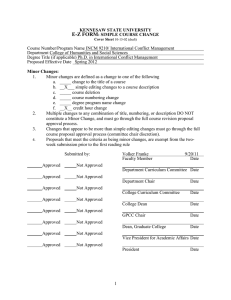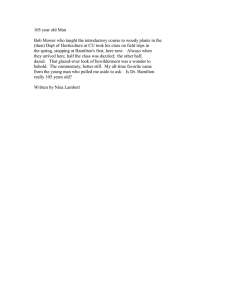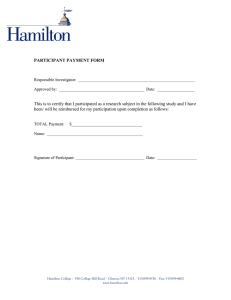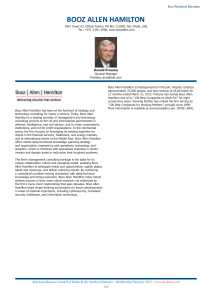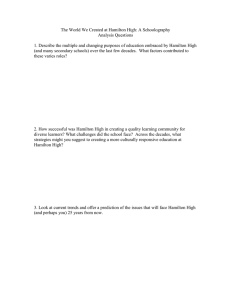GRADUATE COURSE PROPOSAL OR REVISION, Cover Sheet
advertisement
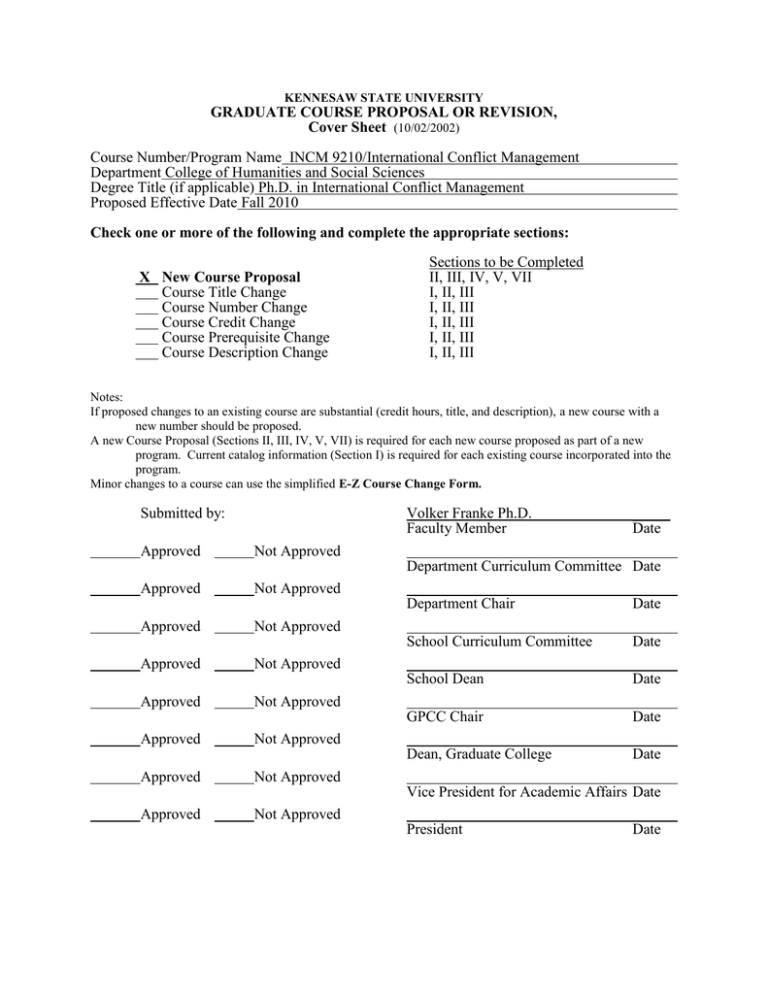
KENNESAW STATE UNIVERSITY GRADUATE COURSE PROPOSAL OR REVISION, Cover Sheet (10/02/2002) Course Number/Program Name INCM 9210/International Conflict Management Department College of Humanities and Social Sciences Degree Title (if applicable) Ph.D. in International Conflict Management Proposed Effective Date Fall 2010 Check one or more of the following and complete the appropriate sections: X New Course Proposal Course Title Change Course Number Change Course Credit Change Course Prerequisite Change Course Description Change Sections to be Completed II, III, IV, V, VII I, II, III I, II, III I, II, III I, II, III I, II, III Notes: If proposed changes to an existing course are substantial (credit hours, title, and description), a new course with a new number should be proposed. A new Course Proposal (Sections II, III, IV, V, VII) is required for each new course proposed as part of a new program. Current catalog information (Section I) is required for each existing course incorporated into the program. Minor changes to a course can use the simplified E-Z Course Change Form. Submitted by: Approved Volker Franke Ph.D. Faculty Member _____ Date Not Approved Department Curriculum Committee Date Approved Approved Approved Approved Approved Approved Not Approved Department Chair Date School Curriculum Committee Date School Dean Date GPCC Chair Date Dean, Graduate College Date Not Approved Not Approved Not Approved Not Approved Not Approved Vice President for Academic Affairs Date Approved Not Approved President Date KENNESAW STATE UNIVERSITY GRADUATE COURSE/CONCENTRATION/PROGRAM CHANGE I. Current Information (Fill in for changes) Page Number in Current Catalog Course Prefix and Number Course Title Credit Hours Prerequisites_ Description (or Current Degree Requirements) II. Proposed Information (Fill in for changes and new courses) Course Prefix and Number INCM 9210_____________________________ Course Title Advanced Quantitative Methods Credit Hours 3-2-4 Prerequisites INCM 9102 Quantitative Methods Description (or Proposed Degree Requirements) This course will cover advanced topics beyond those covered in INCM 9102: Quantitative Methods such as nonlinear statistical methods, game theory, social networking analysis, spatial statistical analysis, and aggregate data analysis. The lab component will involve advanced use of statistical packages in the analysis of international conflicts. III. Justification This course provides the student with advanced knowledge to excel in research methods after completion of Quantitative Methods. IV. Additional Information (for New Courses only) Instructor:_ Richard Engstrom, Ph.D. Text: Prerequisites: INCM 9102 Quantitative Methods Objectives: Identify research questions and data characteristics that require the use of maximum likelihood estimation techniques. Explain key concepts associated with MLE approaches to statistical analysis. Formulate a research question, theory, and a hypothesis that can be tested with appropriate data. Collect original data in a manner appropriate for use in statistical analysis using MLE techniques. Use STATA statistical software to analyze data. Relate statistical results to the research question guiding the research project. Present, in oral and written form, the results of an MLE analysis. Instructional Method -Class discussion, lectures, projects Method of Evaluation -Tests, presentation, research paper and class participation V. Resources and Funding Required (New Courses only) Resource Amount Faculty Other Personnel Equipment Supplies Travel New Books New Journals Other (Specify) TOTAL Funding Required Beyond Normal Departmental Growth The costs are included in the overall cost for the new Ph.D. program and are not separate. VI. COURSE MASTER FORM This form will be completed by the requesting department and will be sent to the Office of the Registrar once the course has been approved by the Office of the President. The form is required for all new courses. DISCIPLINE COURSE NUMBER COURSE TITLE FOR LABEL (Note: Limit 16 spaces) CLASS-LAB-CREDIT HOURS Approval, Effective Term Grades Allowed (Regular or S/U) If course used to satisfy CPC, what areas? Learning Support Programs courses which are required as prerequisites INCM 9210 Advanced Quantitative Methods 3-2-4 Fall 2010 Regular APPROVED: ________________________________________________ Vice President for Academic Affairs or Designee __ VII Attach Syllabus INCM 9210: Advanced Quantitative Methods Ph.D. Program in International Conflict Management Kennesaw State University I. Professor Contact Information: Dr. Richard N. Engstrom Room 2040B, Social Sciences Building rengstro@kennesaw.edu 678-797-2930 II. Course Pre-requisites, Co-requisites, and/or Other Restrictions INCM 9102 III. Course Description This course moves beyond OLS regression models, and focuses on Maximum Likelihood Estimation; a set of nonlinear approaches to applying statistical methods to discrete choice data. We will examine methods for handling binary, multichotomous, ordered, and count dependent variables. Students are expected to participate in class, will take a midterm and a final exam, will write a final research paper and present the results of their paper in class. Students will use the STATA statistical package to conduct the analysis for their research papers. IV. Student Learning Objectives/Outcomes After successfully completing this class, students will be able to: Identify research questions and data characteristics that require the use of maximum likelihood estimation techniques. Explain key concepts associated with MLE approaches to statistical analysis. Formulate a research question, theory, and a hypothesis that can be tested with appropriate data. Collect original data in a manner appropriate for use in statistical analysis using MLE techniques. Use STATA statistical software to analyze data. Relate statistical results to the research question guiding the research project. Present, in oral and written form, the results of an MLE analysis. V. Textbooks and Materials Greene, William H. 2008. Econometric Analysis, 6th Edition. Prentice Hall. Hamilton, Lawrence C. 2009. Statistics With STATA. Cengage. King, Gary. 1995. Unifying Political Methodology: The Likelihood Theory of Statistical Inference. University of Michigan Press. Long, Scott. 1997. Regression Models for Categorical and Limited Dependent Variables. Sage Publications. Several published research articles as identified in the Course Outline. VI. Course Outline Week 1: Introduction to MLE Assignment: Locate a research article that uses maximum likelihood estimation, read and summarize it, and bring it to class. Week 1 Lab: Intro to STATA Hamilton: Chapter 1 Week 2: Theory and Examples of MLE research Greene: Chapter 16 and Appendix E.1-E.4. King: Chapters 1-3. Week 2 Lab: Datasets and Data Management Hamilton: Chapter 2 Week 3: Binary Dependent Variables I: Logit and Probit Greene: Chapter 23.1-23.4 King: Chapter 4 Long: Chapter 3 Week 3 Lab: Displaying Data Using Graphs Hamilton: Chapter 3 Week 4: Binary Dependent Variables II: Scobit, Heteroskedastic Probit, Rare Events Logit Alvarez, R. Michael. 1995. “American Ambivalence Towards Abortion Policy.” American Journal of Political Science 39:1055-1082 Beck, Nathaniel, Gary King, and Langche Zeng. 2004. “Theory and Evidence in International Conflict: A Response to de Marchi, Gelpi, and Grynaviski.” American Political Science Review 98:379-389. Golder, Sona. 2006. “Pre-Electoral Coalition Formation in Parliamentary Democracies.” British Journal of Political Science 36:193-212. King, Gary, and Langche Zeng. 2001. “Explaining Rare Events in International Relations.” International Organizations 55:693-715. Nagler, Jonathan. 1991. “The Effect of Registration Laws and Education on U.S. Voter Turnout.” American Journal of Political Science 85:1393-1405. Nagler, Jonathan. 1994. Scobit: An Alternative Estimator to Logit and Probit.” American Journal of Political Science 38:230-255. Week 4 Lab: Displaying Data Using Tables Hamilton: Chapter 4 Week 5: Multichotomous Dependent Variables I Greene: Chapters 17 and 23.11 Long: Chapter 6 Week 5 Lab: Comparison Methods in STATA Hamilton: Chapter 5 Week 6: Multichotomous Dependent Variables II Alvarez, R. Michael, Jonathan Nagler, and Shaun Bowler. 2000. “Issues, Economics, and the Dynamics of Multiparty Elections: The British 1987 General Election.” American Political Science Review 94: 131-149. Martin, Lanny and Randolph T. Stevenson. 2001. “Government Formation in Parliamentary Democracies.” American Journal of Political Science 45:33-50. Quinn, Kevin, Andrew Martin, and Andrew Whitford. “Voter Choice in Multi-Party Democracies: A Test of Competing Theories and Models.” American Journal of Political Science 43:1231-1247. Week 6 Lab: Regression Procedures Hamilton: Chapter 6 Week 7: Midterm Exam Week 8: Paper Workshop Nagler, Jonathan. 1995. “Coding Style and Good Computing Practices.” The Political Methodologist 6:2. Students should come to class with a research question that they intend to use for their final paper. We will discuss the paper ideas, and the practical issues of data collection and analysis, in class. Week 8 Lab: Diagnostic Procedures Hamilton: Chapter 7 Week 9: Ordered Response Models Greene: Chapter 23.10 Long: Chapter 5 Gelpi, Christopher. 1997. “Crime and Punishment: The Role of Norms in Crisis Bargaining.” American Political Science Review 91:339-360. Week 9 Lab: Nonlinear Regression Hamilton: Chapter 8 Week 10: Event Counts Greene: Chapter 25.1-25.5 Long: Chapter 8 Gowa, Joanne. 1998. “Politics at the Water’s Edge: Parties, Voters, and the Use of Force Abroad.” International Organization 52:307-324. King, Gary. 1989. “Event Count Models for International Relations: Generalizations and Applications.” International Studies Quarterly 33:123-147. Week 10 Lab: Robust Models and Logistic Regression Hamilton: Chapters 9 and 10 Week 11: Paper Workshop II King, Gary, Michael Tomz, and Jason Wittenberg. 2000. “Making the Most of Statistical Analyses: Improving Interpretation and Presentation.” American Journal of Political Science 44:341-355. Students should come to class ready to discuss their STATA output. Week 11 Lab: Event Count Models Hamilton: Chapter 11 Week 12: Student Presentations I Week 12 Lab: Principal Component, Factor, and Cluster Analysis Hamilton: Chapter 12 Week 13: Student Presentations II Week 13 Lab: Time Series Hamilton: Chapter 13 Week 14: Extensions I: Time Series and Multiple Equation Models King: Chapters 6-8 Week 14 Lab: Survey Data Hamilton: Chapter 14 Week 15: Extensions II: Nonrandom Selection Models King: Chapters 9-11 Papers Due Week 15 Lab: Multilevel and Fixed Effects Models Hamilton: Chapter 15 TBD: Final Exam VII. Grading Policy Grades will be calculated as follows: Mid-term test: 25% Final test: 25% Oral Presentation: 15% Research Paper: 25% Class Participation: 10% Grading scale: A: 90-100; B: 80-89; C: 70-79; D: 60-69; F: < 60 VIII. Academic Integrity Every KSU student is responsible for upholding the provisions of the Student Code of Conduct, as published in the Undergraduate and Graduate Catalogs. Section II of the Student Code of Conduct addresses the University's policy on academic honesty, including provisions regarding plagiarism and cheating, unauthorized access to University materials, misrepresentation/falsification of University records or academic work, malicious removal, retention, or destruction of library materials, malicious/intentional misuse of computer facilities and/or services, and misuse of student identification cards. Incidents of alleged academic misconduct will be handled through the established procedures of the University Judiciary Program, which includes either an "informal" resolution by a faculty member, resulting in a grade adjustment, or a formal hearing procedure, which may subject a student to the Code of Conduct's minimum one semester suspension requirement. IX. ADA Statement Any student who, because of a disabling condition, may require some special arrangements in order to meet the course requirements should contact the instructor as soon as possible to arrange the necessary accommodations. Students should present appropriate verification from KSU disAbled Student Support Services. No requirement exists that accommodations be made prior to completion of this approved University process. Accommodations are arranged on an individualized, as-needed basis after the needs and circumstances have been evaluated. The following individuals have been designated by the President of the University to provide assistance and ensure compliance with the ADA. Should you require assistance or have further questions about the ADA, please contact: Carol Pope, Asst. Dir. for disAbled Student Support Services 770-423-6443, 770-423-6667F, 770-423-6480TTY cpope@kennesaw.edu disAbled Student Support Services Website http://www.kennesaw.edu/stu_dev/dsss/dsss.html
